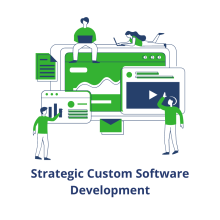
Digital solutions are an inescapable component of success for modern business. Every day, more and more companies are exploring ways to leverage software and web development solutions to transform their operations digitally. No longer is the most pertinent question whether or not you should invest in software solutions, but rather how should you invest?
More to the point, should you invest in custom-developed software or off-the-shelf software solutions? The best answer, perhaps surprisingly, is often somewhere in between those two options. I'm going to explain to you why.
But first, what are some reasons an organization might face this question, and what do these opposite spectrum options entail?
Modern Businesses Rely Upon Digital Transformation to Grow
Growing businesses must address several operational challenges every month. These challenges range from generating new revenue opportunities, providing support and resources to customers, or even distributing products and services in an entirely digital format. The modern website can and often should play a central role in organizing these various initiatives. You can operate integrated marketing and sales tools through your website, manage support documentation for access by registered users, and provide online chat for customer inquiries. You might even offer a digital service built right into your website, like an online educational course program.
Digital transformation is the concept of utilizing software and digital tools to enhance your business operations at a fundamental level. At the heart of digital transformation is the intent to use software to facilitate substantial change in how your employees work and deliver services and how your customers interact with your business.
Most Software Solutions are Web Development Projects in Nature
Because of this, most software development projects are going to end up being web development. The cloud offers so many compelling capabilities for information exchange and connectivity. The products of the previous decade have mostly given way to their online or cloud-enabled descendants. Quickbooks gave rise to Quickbooks Online, and Microsoft Office became Microsoft Office 365.
Your organization will inevitably need to invest in digital solutions to grow and meet the demands of your future customers. It is just a matter of when and how effective your journey will be down that path.
Software-as-a-Service is a Quick Fix
The examples mentioned above of Quickbooks Online and Microsoft 365 are products referred to as Software-as-a-Service or SaaS solutions. Some of the key concepts with this approach are that companies often don't want to invest heavily in custom solutions but instead find an "off the shelf" option, typical in the cloud, to which you can regularly subscribe to acquire a particular kind of service. These services might range from publishing, accounting, analytics to just about anything you can do online. SaaS products can be as quick as creating an account and filling in credit card info - and that ease is one of the attractions. Easy come, and easy go means you can feel unencumbered by substantial investments in software that cause organizations to continue using ineffective tools.
SaaS is Rarely One Size Fits All
The market's growth for SaaS solutions is in part driven by the potential for scaling your audience to a prodigious size. Imagine if your potential customer base was the majority of businesses in the world relying upon operations using the internet. That's a lot of companies. Your product will need to be reasonably generalized to meet the needs of the largest and most profitable audience. Furthermore, in every case where a vendor customizes their product to meet a customer's unique needs, it invites a reduction in product clarity and potential profits.
This drive for scale highlights some of the most common pitfalls for businesses using proprietary software-as-a-service solutions:
- The software solution will likely not be capable of one or more aspects of your operation unique to your specific organization and how you do business.
- You will have little to no say in tailoring the software to meet your specific needs since you don't own the software.
- If the software vendor can customize your software service, the engagement is likely to be very expensive, and you will still have no ownership of that software.
- The worst-case scenario is that you like your SaaS solution, but the vendor goes out of business or decides to shut down the service one day. Google has certainly done that a few times with some of its various side-projects. Hopefully, your company didn't require that product to survive.
Custom Software is a Solution That You Own
Custom software that has been built from the ground up specifically for you is a very different investment and experience than licensing proprietary "off-the-shelf" software. First of all, when you are investing the resources to have the custom solution built, you will own it. There might be business models and development agreements that deviate from that, but generally speaking, if you pay to have a new software product developed, you get to have control of it.
This level of ownership is in profound contrast to proprietary SaaS solutions in that your prerogative enables you to customize and repurpose your custom software as much as you want. Suppose you have a very specialized approach to your business model that various SaaS solutions are too generalized to capture profitably. In that case, custom software can accommodate those needs with precise and custom-tailored solutions.
Customized Software Comes With a Significant Cost
Having your software custom-developed to meet your specific needs is not going to be cheap. These types of projects can be complex and time-consuming, and that has a cost. That sort of cost comes upfront, but the more customized your software system is, the higher the lifetime cost of ownership is likely to be. You'll be on the hook for paying to keep the software maintained as programming languages and frameworks change over time and possibly overhaul it entirely if it exists for many years. Finally, there is a potential opportunity cost of having developers available that are well-equipped to support your custom software. Depending on how the software is programmed and the level of complexity, it may be complicated and expensive to bring on board a new developer team to take over the support of your software.
A Hybrid Approach Between Proprietary and Fully Bespoke Custom is Ideal
After covering these two very different approaches to software development, you may think that neither will suit your needs very well. Are your options just affordable yet settling for only good enough, or expensive yet precisely what you need?
Actually, no, there is a middle-ground or hybrid approach that can focus on leveraging existing prebuilt components for affordability and quicker time-to-market, and also customize those components to meet your specific needs but do so in a sustainable manner.
This approach is how our company delivers product solutions to our clients, and its foundation comes from open-source software frameworks like Drupal.
Open-source frameworks like Drupal are different from proprietary systems in that no one organization owns the software. The source code can be shared and is open to public scrutiny. This open-access allows for the codebase to be improved continuously by a diverse audience of developers worldwide. Furthermore, there is the capability for programmers in this community to contribute new modules, plugins, and functionalities to evolve the software framework.
#1 - You Won't Reinvent the Wheel
Content management systems and development frameworks like Drupal come with various prebuilt solutions to user needs already figured out long ago. Mundane features like the ability to log in to a website and manage a user profile or incorporating an editorial workflow to content management are already "done." Your software development project can leap forward and utilize these "out of the box" systems to more quickly get to the unique components of your organization. You'll save time and money by not reinventing the wheel.
#2 - You'll Have a Path of Extensibility
On the other hand, a platform like Drupal enables you to reliably and safely "extend" the codebase to customize it to your unique needs. As a software development framework, it is designed purposefully to be customized so that all of its components can integrate successfully. The key here is that you must develop them according to best practices. And, since nobody technically owns the open source software, nobody can tell you no if you want to customize it.
#3 - You'll Have More Resources For Support
By working with a widely adopted open source platform like Drupal, you will be able to rely on a large pool of potential developers who will step into your project and quickly understand and support your software. Having access to this support reduces the likelihood of the problem cropping up where you invest a lot of resources into making your software system and the original developers move on, leaving you with nobody to nurture and support it into the future.
However, Your Needs and Constraints May Vary. Act Strategically.
Ultimately, your specific needs and constraints may vary depending on the size, age, or type of organization you have. As such, so will the software development approach that will be the best fit for you. However, one constant that remains in all cases is that investing in software is vital. Approach the digital transformation process with a strategic mindset that considers your near-term constraints and your long-term goals. Find a team that can operate in that manner and will serve you best.
If you're looking for a web development and digital strategy company that thinks that way, we should talk!
